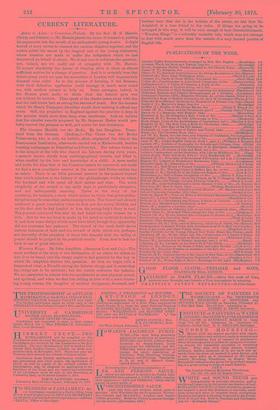The Countess Matilda von der Recke. By her Daughter. Trans-
lated from the German. (Seoleys.)—The Count von der Recke Volmerstein, who is still, we believe, alive, originated the idea of the Deaconesses' Institution, afterwards carried out at Raiserwerth, besides creating orphanages at Diisselthal and Overdyk. The volume before us is the memoir of the wife who shared his labours during forty years, a memoir drawn chiefly from autobiographical records, and filled in when needful by the love and knowledge of a child. A more useful and noble life than that of the Countess cannot be conceived, nor could we find a more conclusive answer to the sneer that Protestantism has no saints. There is no little personal interest in the memoir beyond that which attaches to the history of the philanthropic works on which the husband and wife spent all their means and time. The naive simplicity of the record of her early days is particularly attractive, and not nnfrequently amusing. There is the story of the courtship, for instance, a story which makes ns think that great philan- thropists may be somewhat embarrassing lovers. The Count had already achieved a great reputation when he first saw the young Matilda, and on his first visit he had handed to him the young lady's diary to read.
The perusal convinced him that he had found the right woman for a wife. But he was too busy to make up his mind or certainly to declare it, and then came delays which must have tried, though they apparently did not overcome her patience. The record of the work itself shows curious instances of faith and the reward of faith which are, perhaps, not unworthy of the attention of those who demand that the utility of prayer should be judged by its practical results. From first to last the book is one of great interest.


































 Previous page
Previous page